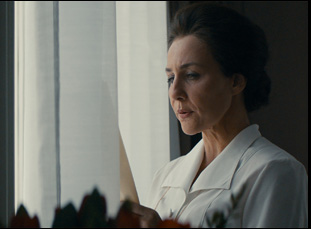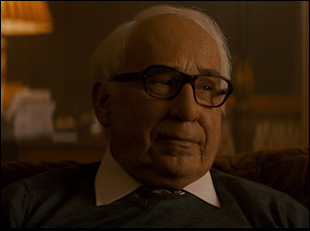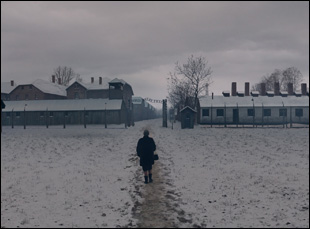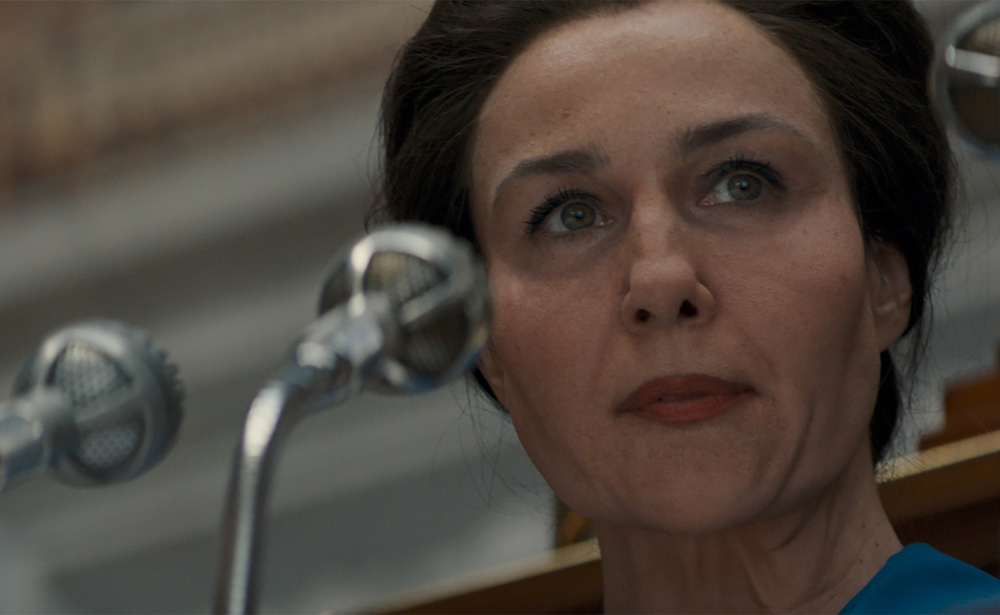“Memories isn’t images, it’s words,” Antoine (Olivier Gourmet) reminds his wife Simone Veil in “Simone: Woman of the Century,” though director Olivier Dahan might contradict his own script when there’s any number of powerful visuals in his latest film about the iconoclastic French politician who often was the only woman in the room as she worked her way through the corridors of power. A champion of equality in all its forms after becoming health minister and ultimately President of the European Parliament in the late 1970s, Veil’s devotion to making abortion legal and available to all and improving prison conditions for the incarcerated could be traced back to her roots as a Holocaust survivor who lost relatives at the camps, among them her mother, and endured unthinkable pain in the years to follow including the death of her older sister Madeleine in a car accident, and the less obvious but no less hurtful assignment of being seen as a second fiddle to her husband when it comes to political aspirations, though the two built essentially the same track record since meeting at law school.
If Veil ultimately persevered to become a beloved public servant in France through sheer force of will, it is somewhat fitting that a film version of her life was only made possible through a similar resolve by Elsa Zylberstein, who applied the totality of a three-decade career starring in such films as “I’ve Loved You So Long” and Claude Lelouch’s “Un Plus Une” not only to her performance as Veil in her later years (the is played as a teenager by the equally fierce Rebecca Marder), but in her first-time role as a producer. While Dahan might’ve been a natural choice to direct after bringing out the human side of larger-than-life icons such as Edith Piaf (“Ma Vie En Rose”) and Grace Kelly (“Grace of Monaco”), the reasons he would be perfect for it were the same as why he wouldn’t want to take on another life story, yet Zylberstein won him over as she did so many others on the way to pulling off this massive undertaking that covers not only the major events in Veil’s life, but the 20th century as a whole when she was such a pivotal figure and her work touched the lives of so many.
That tenacity didn’t only play out behind the scenes, but can be seen clearly in the verve with which “Simone: Woman of the Century” plays out, told in retrospect as Veil sits off to the side of the same lake she once enjoyed time with her parents and now can be visited by grandchildren, yet moving fluidly between all the points of connection in her life that made her so formidable and determined, continually locating the moments where she was able to turn tragedy to triumph and noting that all progress is continually under threat without constant attentiveness (particularly when one of Veil’s chief rivals in the European Parliament was Jean-Marine Le Pen, father of current far-right politician Marine Le Pen). After becoming a major hit in its native France, “Simone: Woman of the Century” is arriving in America where it will be no less inspiring in our current political environment and recently, Zylberstein and Dahan spoke about how they came to collaborate on the film, the secret to evoking someone’s life so vividly on screen and the motivation they took away that will propel them into their next projects.

Elsa Zylberstein: I was asked to give [Simone] a prize many years ago, and of course, we all grew up with her in France, but I began reading [about her] to write something and give her a prize. And I was [speaking] in front of [her] whole family and they asked me to come to the table [after], and that’s how we met. Then she came for dinner at my house. And little by little, I thought, “What a woman. Her life has to be told for the younger generation. It has to be said somewhere,” because documentary or a book is different. And a person from her family ran into me a couple of months after and said, “Elsa, I had just had lunch with Simone, and she just told me if one day there’s a film, the only actress she would want is you.” Now I’m telling the story for you in America, because in France I was not allowed to say this [because] it felt pretentious, but I feel I can tell it the story now that the film is a big success in France.
And it’s very beautiful because [this] gave me the power to try to develop the film. When she was still alive, it was not possible. Then I went to the funeral, and I said, “Okay, I’ll do it,” and I had one obsession [to work with] Olivier Dahan. I knew it was for him, and then I found two producers [Romain Le Grand and Vivien Aslanian], who were just coming out of Pathe, and Olivier said yes, in half-an-hour.
Olivier Dahan: I was in a period of time where I was actually a little bored with the movies, so I didn’t want to direct for a few years before. When [Elsa] came to my house and started to speak to me about maybe writing something about Simone Veil, the morning after I was reading the first pages of her autobiography, and in the first pages, Simone Weil was speaking about the place where she used to spend her family holidays in the ’30s, and this place is actually where I was born, so that made a connection, and I only write or direct scenes that I really want to make. Everything in the movie is documented, but at one point, I need the material to speak about me, actually. When I was doing “La Vie en Rose”, I was speaking about my feelings at that period of time, and with Simone, it was more intimate. I wanted to speak about my father, who was actually dying at that point. And on my father’s side, there are Jewish [relatives], and some of them have been in Auschwitz, so I wanted to make something about that subject, the Shoah.
Elsa, given your own research, did you let Olivier go off and do his own thing or were you working with him on development?
Elsa Zylberstein: No, maybe it would be different other times, but this time I just want to see Olivier. And I say, Simon Veil. He said, okay. I took, you know, I stayed with him for two hours. I went back home and he said, “Okay, I’ll do it.” And then I considered it was his film. It has to be written by him. He wanted to write it. I didn’t interfere. Maybe another day I will do it for another film. But this time I just thought he’s doing his film. And I need to go back to be an instrument. I needed to be back and to stay an actress for him.
Olivier Dahan: Most of the time [I was writing this, I was] talking about myself actually, and my feelings through the eyes of Simone. I don’t write biopics. I’m not really interested in them. It’s too simple or too distant in a way, most of the time. The director or the author are not trying to get into deep material and they don’t engage themselves in the character so much because the character already exists. But for me, I wanted to look through her eyes in my own way. I was not working with like a breakdown or a plan. I was just letting my mind flow with a lot of [research], but I wanted to make something more intimate, even if there is some big scenes in Auschwitz or [historical events].
When you’ve got two actresses playing one character, is it difficult to keep a consistency?
Olivier Dahan: It was very scary at the beginning because when we were actually preparing the movie, it was the main obstacle because I was really wondering if the public would accept the fact that there are two women to interpret one single one. I didn’t know if it was going to work or not during the prep and because of the writing in disorder, it’s like you go from a period to another without without warning, and that’s a lot to have an actress to make the character [grow], but finally, it went very well.
Elsa Zylberstein: Olivier did what he wanted to do. I played her from 37 to 87, so it has to be different [over time], the way she talks in public when she’s doing speeches to the way she talks in her family. Everything has to be different. So it was a lot of work, and I had to learn everything from the bottom of my heart — from my feet to my skin, everything had to be changed. I learned how to walk like her. I was wearing her shoes for a year. I observed every gesture, everything she was doing, and I maybe watched 100 times how she was walking.
I had crazy idea one day [to go to] Institute Tomatis, a place in Paris to learn languages when you want to learn English or French or Italian, and I thought, “Oh, maybe I’m going to learn Simone Veil — how to talk like Simone Veil.” And I called them and I said, “Okay, you can [teach] Italian and English, but can [you teach me] how to talk like someone?” And they said no and hung up the phone. [laughs] But an hour after, they call me back and they say, “We think it’s very interesting,” so then they studied my ear and my voice, and for six months, I’ve been listening to voices, to rhythm, to music, to oral speeches, everything she did, get it lower, slower, quicker because I wanted it to become like a second nature.

Olivier Dahan: I’ve written that scene that that way to make a single shot because I really wanted to express the oppression that the survivors [of the Holocaust] were actually feeling [when] it was not really morally allowed to talk about the Shoah when you were a survivor because that wasn’t the time. So I tried to make [that feeling] into the scene [where] she’s actually suffocating in the theater and has a panic attack — and I really know what is a panic attack because I have [them] sometimes. And I love long shots. [For “Ma Vie En Rose,”] for example, there was a big long shot — when [Edith Piaf, played by Marion Cotillard] gets up off the bed, she goes into the kitchen, she’s looking for Marcel, and it ends up on the scene where she’s singing. But I didn’t want to [do] the same, so actually, this is the complete opposite. It starts on the scene with a dancer on stage and it ends in the bedroom. If you stick one with the other, it will make a sort of loop.
Is it true that you don’t storyboard anything in advance? A scene like that would seem like it would need massive prep work.
Olivier Dahan: Yeah, I don’t work with storyboard. I don’t even really read the script [after its written]. I read the scene twice in the morning for the day, and then I put the script away, and then I start to focus myself on what is important in the scene I have to do within the day. So it’s an art performance more than making a movie. I do that way because I learned my job in an art school and not in a cinema school, so I’ve been trained to always have like an idea and [act] very quickly. So I like to go fast, and I think like to have a storyboard will actually slow me down. But I really trust my intuition. That’s all I have. Then after, there is the editing process and I think with another approach. It’s still my intuition, but with more of a reflection and more thinking. On the set, when I’m doing the directing, I don’t want to use my brain too much, but my feelings and the way I wake up in the morning. I don’t have any predisposition. It’s more like an art performance on the set with everyone.
Elsa, is that an exciting way to work?
Elsa Zylberstein: You know, I’m a very flexible actress. Everything is fine for me. If people would like to rehearse, I’m like [great]. If they don’t, I’m perfect. When I get onto the set, I was ready. I was [Simone]. There was no question [after] a year of preparation. Sometimes Olivier was calling me and my coach saying “What are you doing guys?” [laughs] I said, “No, no, no, we’re just learning the lines.” But it took me so long. It’s part of the deal that I wanted to become her. She was such a figure in France. She’s not only responsible for [creating access for] abortion, but she was a force of nature, especially a force of resilience because of what she went through. She went through hell. She was traumatized as a Holocaust survivor, seeing her mother die in front of her and she lost her sister, but she is very strong. And for a woman like me and others, she’s an example. I think [in the film] it’s a very interesting moment to see such a woman having fought like crazy in front of a national assembly. There were 281 men, and 11 women, and they talked to her as if she was a Nazi. She was [like] a Ruth Bader Ginsburg for me, so it was a very important film for me to be done and a political act.

Olivier Dahan: It was a complete improvisation because I’ve been shooting in the Parliament for one day and we didn’t have the time to shoot the whole scene in the Parliament, so a lot of the lines were missing. So during the night, I was wondering with my first [assistant director], “Okay, what are we going to do?” We don’t have even half of the scene and it’s too late. We cannot go back to the Parliament. So I had this idea of shooting on the black screen and during the night, we booked some studio for the next morning, and we improvised with the actors. All the lines were true [to the historical record], but the way we did it was a complete improvisation and it was a lot of work for the editing, but we didn’t have the choice. We could not make [that scene] in one day, so you have to find a solution for that.
Was this a rejuvenating experience for you Olivier, as far as making movies?
Olivier Dahan: I cannot say I had pleasure to make that movie — it was hard to achieve. But yeah, I want to make movies again now, of course, but in another way. I want to make something different. I did three, let’s say biopic, even if I don’t like the term or the genre. I wanted to make a film about an artist. I wanted to make a film about a princess, and I wanted to make a film about a female politician woman, and I did that now, so I don’t know what’s going to be next.
And for you Elsa, after shepherding this to the screen, what’s it like to have it out in the world?
Elsa Zylberstein: I’m very proud of the work I did, and I’m very proud that the film was the biggest hit of the year, and that people reacted [how they did] and still writing me [now]. I couldn’t believe how much it was close to what we’re going through nowadays, and I’m very, very happy that the film is coming in America, seeing all the states are back [outlawing] abortion. And I want to produce films on women now and I’m developing other films. It’s my goal, and I want to do that for us, for transmission. So I’m very proud as a woman to be a co-producer and an actress [on this film], and I’ve [received] so many letters from women, from young people — 13, 14, 15 — that discovered [Simone Veil] with the film. That’s a very big gift for me and a political act that she needed, and I think the more it goes, the more I want to produce films about women.
“Simone: Woman of the Century” opens on August 18th in Los Angeles at the Laemmle Royal and New York at the Angelika Film Center and August 25th in Chicago at the Wayfarer Theater.




